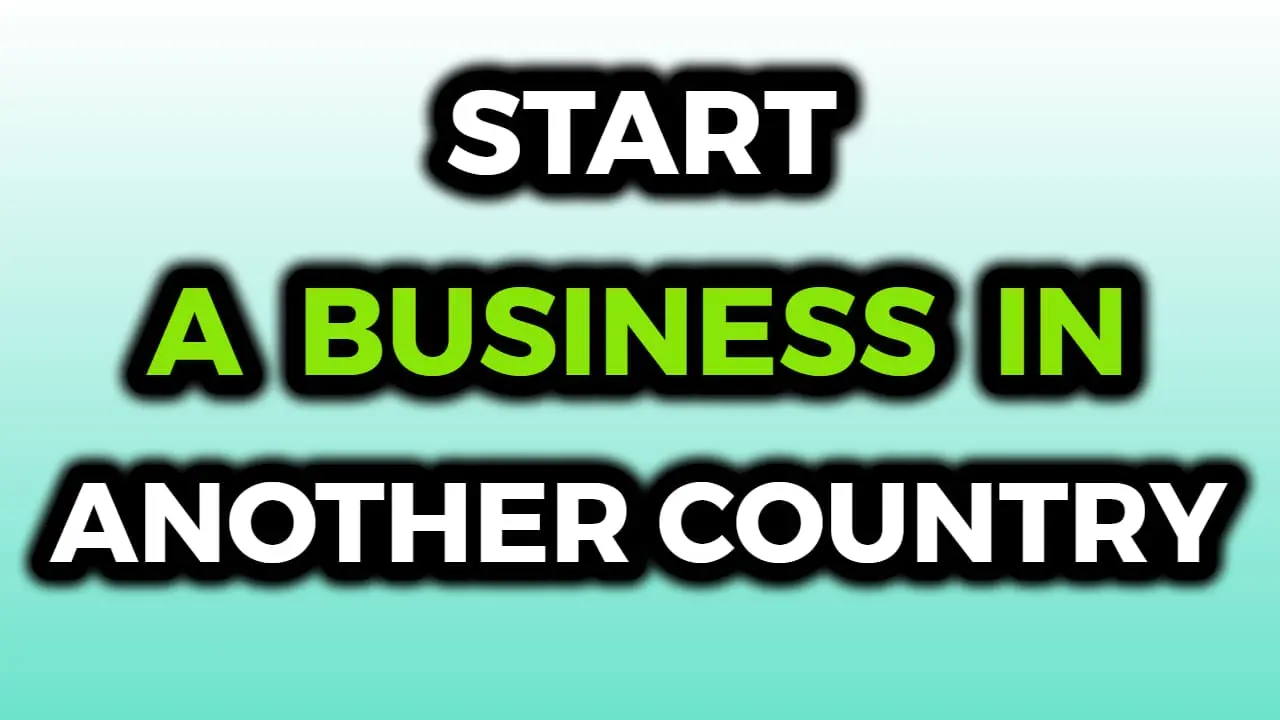How Do You Start A Business In Another Country?

If you want to make job replacing income and want to work online from the comfort of your home or anywhere in the world
Take a look at this - Live Chat Jobs
Starting a business overseas can be a really rewarding experience. You get to travel, see the world and make money by doing something that you love. But it’s also incredibly challenging because of language barriers, cultural differences and other factors that make starting up in another country difficult. In this post, I’ll explain how to do it successfully so you can start your own business abroad!
Decide if starting an international business is right for you.
Before you start a business, it’s important to know what you’re getting into.
If you aren’t sure, don’t do it! There are many reasons why starting an international business might not be the right choice for your situation:
- You may be short on time and resources. If this is the case, take some time to consider whether or not setting up shop in another country makes sense for your current needs and goals. You could also consider establishing an office abroad as part of a larger strategy—or even just taking advantage of some resources available online (like virtual assistants).
- You may have no market research on which markets would work best for your product or service offering (e.g., travel destinations). This means that if someone does decide against moving abroad because they don’t think their product will sell there either way… well then good luck finding anything else worth doing anyway!
Research the business environment in your chosen country.
Before you start a business in another country, it’s important to research the local business environment. Your first step should be checking out the local economy and legal system—you’ll want to know what kind of economy exists there, how long it has been around and whether or not there are any major problems with corruption or graft. You can also look up statistics on unemployment rates and other indicators that will give you a sense of how strong or weak the economy is in your chosen country.
Then look at things like tax rates (if applicable), currency exchange rates between countries, import/export regulations etc. The last thing we recommend doing is researching cultural norms like dress codes; while these may seem trivial at first glance they can have huge impacts on success when running an international business!
Find the best location for your business.
Now that you’ve decided on the type of business you want to start, it’s time to find your location.
- Consider where your target market lives and works. If you’re going for a specific audience, doing so will help determine which city or region has the most people similar to them.
- Check out cost of living in various cities around the world by looking at data from Numbeo or Expatistan (both websites provide rankings based on factors like taxes and utility costs). You can also use tools like Google Flights’ search bar or TripAdvisor’s website as resources for determining how much money people pay per month when they visit certain cities—that way, if one city seems cheaper than others but still doesn’t match up with what your business needs financially, there might be something else out there worth considering instead!
- Determine whether there are any environmental concerns specific about this area versus others near where I want my company base would likely be located within these countries.”
Work on and refine your business plan.
A business plan is a document that outlines the goals, mission and vision for your new venture. It’s important to have one because it helps you think about what you want to do in the future and allows you to communicate with potential investors or partners. You can write your own business plan or use the template provided by many organizations like SBA (Small Business Administration) or BizXchange.
The first step in creating a great business plan is deciding on a topic area: whether it’s food production or transportation services; manufacturing products versus selling services; etcetera… The second step is determining how long it will take before profits begin coming in—how much capital will be needed? How much time should pass before growth takes off? These questions will help determine which section of the overall plan gets written first; however, there are many different types of businesses so choose wisely! Once this has been decided upon then start brainstorming ideas about what kind of product/service would best fit into each category mentioned previously – after all nothing beats experience when trying out new ideas so don’t hesitate too long once starting up shop somewhere else other than home turf!”
Assess your personal and business risk appetite.
Before you can move forward with your business ideas, it’s important to assess your personal risk appetite. You may be ready for the challenge of starting a new venture in another country, but only if you are willing to take on some risks that are above and beyond what most people would consider normal.
For example, when it comes to opening an online store or starting a new company from scratch, there are several things that go into making this possible:
- Personal risk tolerance (i.e., how much risk am I willing to take?)
- Business risk tolerance (i.e., how much money do I have available for startup costs?)
Look into sources of funding, including grants, tax breaks and private equity.
Once you’ve identified the country where you want to start your business, look into sources of funding, including grants, tax breaks and private equity.
You may be able to access government-funded programs or loans that will help with some of the costs associated with starting your venture. You might also find opportunities from other organizations that can provide assistance in terms of capital investment or mentorship.
Budget for travel and accommodation costs to spend time in the country you’ve chosen.
It is important to visit the country you want to start a business in before starting your company. This will help you get an idea of what it’s like and how locals live there. You’ll also be able to meet people and get a feel for their culture, allowing you to make better decisions about where to set up your business.
If possible, try not too go on holiday during this time because then it can feel like work!
Figure out the language barrier and how you’ll cross it.
You’ll need to find a local business partner who can help you with the language barrier. If you’re fluent in another language, it may be possible for you to jump right into this role, but if not don’t give up just yet! It’s important that your business has someone on board who understands what needs doing and how best to do it.
When hiring a translator or employee, make sure they’re fully qualified before taking on any work tasks related to running the company’s day-to-day operations.
Starting a business internationally is extremely challenging, but also rewarding!
Starting a business internationally is extremely challenging, but also rewarding!
The challenges are many and varied. You will need to learn a new language, understand the local laws and customs, find the right people to work with in order to succeed.
Conclusion
There are many things to consider before starting your own business abroad. Hopefully, this article has given you some tips on what it takes to get started and how long it might take. If you do choose to leave everything behind for a new adventure, remember that it takes hard work and dedication but also lots of patience!





